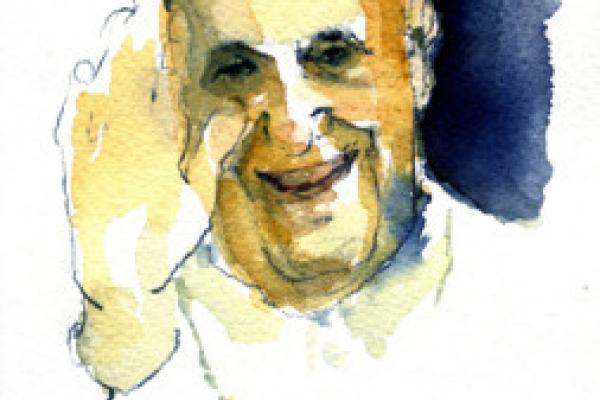Any right-thinking stranger on our shores must read our daily news and think our nation has gone mad. We have cultivated the ability to end lives quickly; and yet we are continually surprised when our fellow citizens use the tools we have devised for exactly the purpose for which we invented them. Come to think of it, I think we’ve gone mad, too.
But our madness is not one that can be cured by laws alone. Laws can help to restrain us, and can help by making it a little less easy for us to find ourselves armed for murder. But we need something more, something that churches are better equipped to offer than legislatures are.
What we need right now is a richer moral imagination. We need better stories to tell ourselves, stories about the kind of people we could be. We need, more than anything, to learn to help one another to do the hard work of choosing not to pull the trigger.
Pope Francis’ comments last week on everything from gays to abortion (less talk, more mercy), the hierarchy (be pastors, not bureaucrats), and religious faith (doubt is part of belief) continue to reverberate through the church and the media.
Here are five broader insights that this wide-ranging interview revealed about Francis — and why they will be keys to reading his pontificate, and perhaps the future of Catholicism.
Federal officials have asked the U.S. Supreme Court to review the government mandate that private companies offer employees birth control coverage despite the business owner’s moral objections, with the company at the center of the suit owned by billionaire evangelical Christians.
Hobby Lobby’s lawsuit has been one of the most high profile of 60-some cases involving the Obama administration’s contraceptive mandate. The arts and crafts chain was founded by David Green, whom Forbes called “the biblical billionaire backing the evangelical movement.”
In June, the Obama administration issued final rules for the mandate that requires most employers to provide contraception at no cost. While there are exemptions for religious groups and affiliated institutions, there are no carve-outs for private businesses with religious owners.
Our relationship to place is so conditioned by our life experiences. When I moved to North Cambridge, Mass., from the expansive West Coast, I got a lesson in the meaning of “near” and “far.” Walking around my new neighborhood, I greeted an old woman sitting in front of her house.
“Did you grow up around here?” I asked.
“Oh no,” she assured me, “I grew up way over on Sherman Street.” Sherman Street is about three blocks from where we were talking, but it is a different neighborhood. So in the language of her personal geography, Sherman Street is not “around here.”
When I traveled to Israel this summer with a group of seminary students from Andover Newton Theological School and Boston University School of Theology, what struck me most was another lesson of geography: If you live in a country the size of New Jersey, your sworn enemy might literally be your next door neighbor.
Like most of the world last spring, I watched in fascination as Jorge Mario Bergoglio was elected pope. The first day, I was non-plussed. Another old, white guy? Big surprise. The second day, I began to take notice: he was a Jesuit and he chose the name Francis, the first pope ever to do so. The third day, I got a little discouraged as Catholic pundits and news organizations across the nation scrambled to prop up his conservative credentials and hardline stances. But as the week unfolded, I heard the stories of how he paid his own bills, carried his own bags, and rode in a modest sedan across town and my heart melted a little bit. Then came his ordination, and in one simple gesture, stopping to cradle a disabled man in his arms, he captured my imagination. I was willing to entertain the possibility that he just might be a different kind of pope.
I’m often asked about what trends I see within Christianity, both good and bad. So in my ongoing effort to help name trends and offer an alternative way of thinking about our faith, here are the five biggest things I’ve seen that tend to keep us from doing our best work as the living, breathing body of Christ in the world today.
1. Church Buildings — Many of our church buildings were established in a time when Christianity was booming numerically in the United States. We could hardly keep up with the growth happening all around us. Understandably, churches popped up where the people were too, drawing many away from their old downtown churches to a more convenient suburban community. But as our numbers have dwindled – combined with the fact the we’re a much more mobile society now that ever before – many churches are becoming monuments to what has long since passed. They have become an albatross rather than an asset.
Citing the need for transparency in the U.S. record on human rights, nearly 200 clergy and religious leaders from North Carolina are seeking the public release of a 6,000-page Senate intelligence report on U.S. torture of terrorism detainees after 9/11.
The letter, dated Aug. 27 and released to the media on Thursday, was sent from the North Carolina Council of Churches in Raleigh to Sen. Richard Burr, a North Carolina Republican who sits on the Senate Select Committee on Intelligence.
The letter, signed by 18 bishops, including the leaders of both of the state’s Catholic dioceses, stated that in light of conflicts in Syria and around the Middle East, transparency on U.S. torture practices was needed.






![Senator Richard Burr photo courtesy US Senate [Public domain], via Wikimedia Commons](https://sojo.net/sites/default/files/styles/large_rectangle_crop/public/blog/Richard_Burr_official_portrait_crop-295x369.jpg?itok=V0nvFrvc)